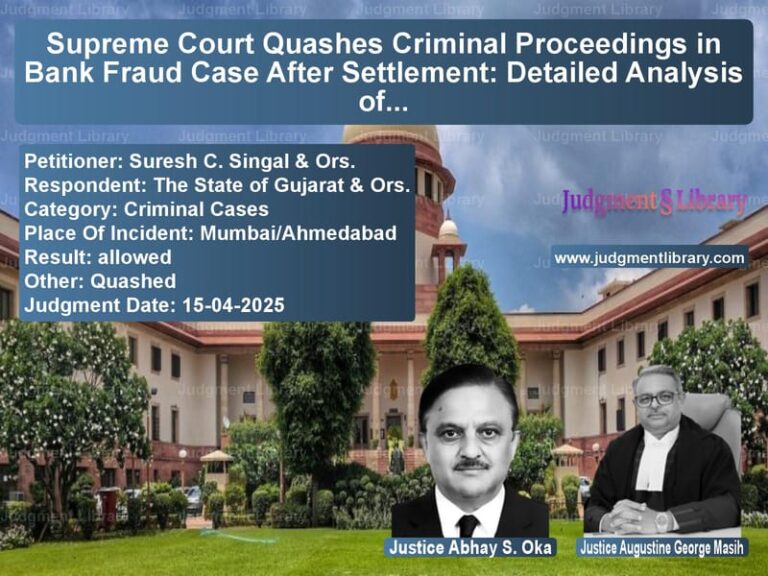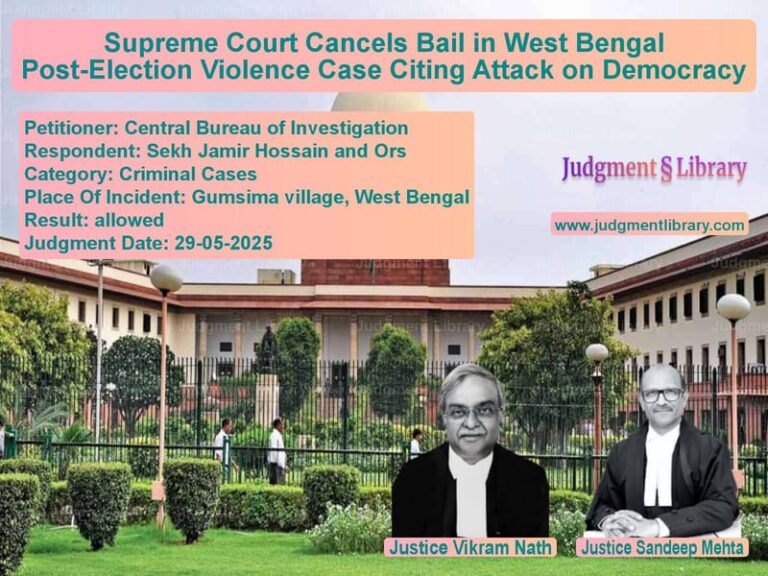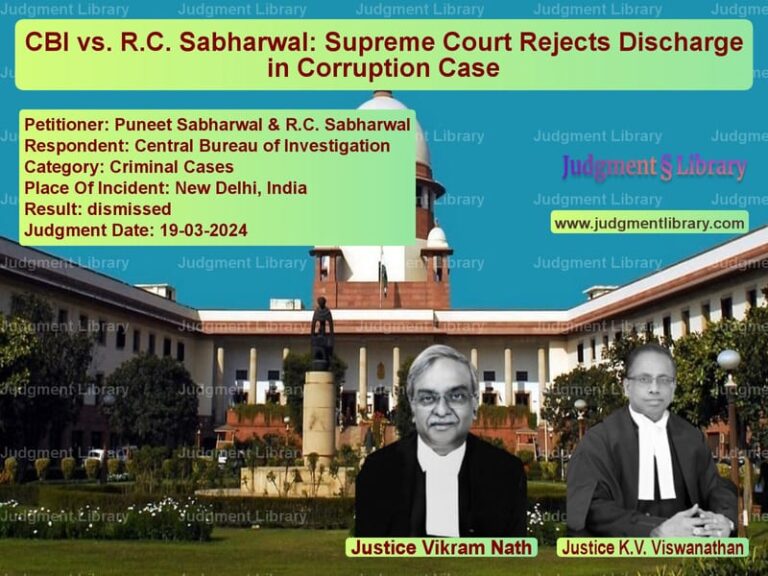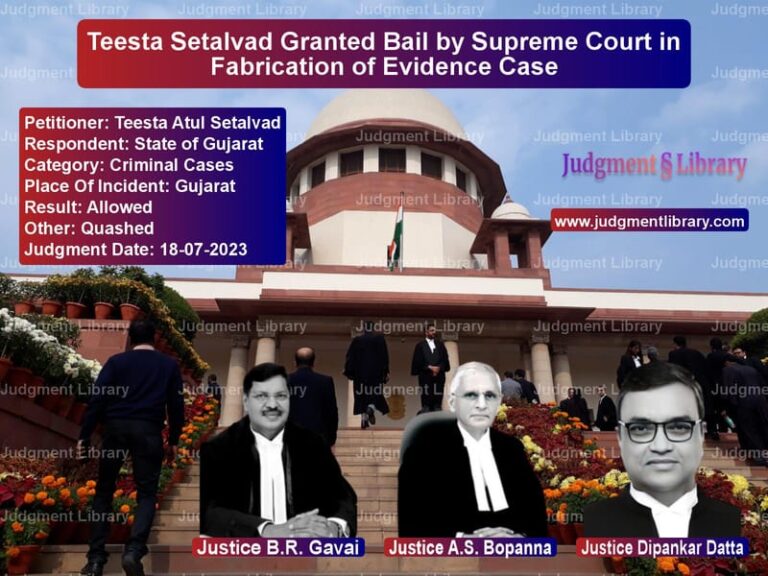Supreme Court Upholds Mortgage by Conditional Sale Under Bengal Money Lenders Act
The Supreme Court of India, in its judgment dated April 4, 2019, addressed a dispute concerning property rights, mortgage by conditional sale, and the application of the Bengal Money Lenders Act, 1940. The case, Atul Chandra Das (D) Through LRS. vs. Rabindra Nath Bhattacharya (D) Through LRS. & Ors., involved an appeal challenging the decision of the Calcutta High Court that upheld the concurrent findings of the lower courts. The Supreme Court dismissed the appeal, reaffirming that the transaction in question was a mortgage by conditional sale rather than an outright sale.
Background of the Case
The case revolved around the ownership and redemption of property, which was allegedly sold through a conditional agreement. The appellants, legal heirs of Atul Chandra Das, challenged the High Court’s ruling that upheld a decision recognizing the transaction as a mortgage by conditional sale.
The dispute originated when, on November 28, 1959, the respondents (Bhattacharyas) executed a registered deed of conveyance in favor of Bholanath Auddy for consideration. However, on December 7, 1959, an agreement for sale was executed in favor of the original respondents, allowing them to repurchase the property within two years.
Later, on August 15, 1960, Bholanath entered into another agreement for sale with Atul Chandra Das for Rs. 9,000. When Bholanath failed to execute the sale, Das filed a suit for specific performance (O.S. No. 171 of 1962). The Calcutta High Court ruled in favor of Das, and after he deposited the balance consideration, a sale deed was executed in his favor.
Das then filed an eviction suit (E.S. No. 782 of 1979) against the Bhattacharyas, claiming ownership. In response, the Bhattacharyas filed a title suit (O.S. No. 1271 of 1980), alleging that the original transaction was a mortgage by conditional sale and sought to redeem the property.
Arguments by the Appellants
- The appellants argued that the courts had erred in treating the 1959 transaction as a mortgage rather than an outright sale.
- They relied on Section 58(c) of the Transfer of Property Act, which states that a mortgage by conditional sale must have its conditions embodied in the same document, while in this case, the conditions were recorded in a separate document.
- The appellants contended that the courts had wrongly applied Section 37(A) of the Bengal Money Lenders Act, which was not relevant to the dispute.
- They also argued that Section 37(A) of the Bengal Money Lenders Act was repugnant to the Transfer of Property Act, making it unconstitutional.
Arguments by the Respondents
- The respondents asserted that the sale deed of November 28, 1959, was merely an ostensible sale and that the agreement of December 7, 1959, was proof of a mortgage by conditional sale.
- They pointed out that they continued in possession of the property, paid municipal taxes, and had full control over the property, proving that the sale was not absolute.
- The respondents relied on Section 37(A) of the Bengal Money Lenders Act, which overrides the requirement under Section 58(c) of the Transfer of Property Act, thereby validating their claim.
Supreme Court’s Observations
- The Court noted that the transaction had all the characteristics of a mortgage by conditional sale, particularly because the Bhattacharyas retained possession and continued paying taxes.
- It upheld the applicability of Section 37(A) of the Bengal Money Lenders Act, which states that any loan secured by an ostensible sale shall be deemed a mortgage, even if the conditions are not in the same document.
- The Court dismissed the appellants’ contention that Section 37(A) was unconstitutional, ruling that it was valid under Article 254(2) of the Constitution since it had received the President’s assent.
- It reaffirmed the findings of the lower courts that the suit filed by the Bhattacharyas was a suit for redemption and was therefore maintainable under the Bengal Money Lenders Act.
Final Judgment
- The Supreme Court dismissed the appeals filed by the heirs of Atul Chandra Das.
- It confirmed that the transaction was a mortgage by conditional sale, allowing the respondents to redeem the property.
- The judgment also validated the application of Section 37(A) of the Bengal Money Lenders Act, ensuring that such transactions are treated as mortgages.
Legal Implications
- This ruling clarifies that Section 37(A) of the Bengal Money Lenders Act overrides the Transfer of Property Act regarding mortgage by conditional sale.
- It reaffirms that transactions where the seller retains possession and a right of repurchase will be deemed mortgages rather than outright sales.
- The ruling strengthens borrower protections under the Bengal Money Lenders Act, preventing creditors from evading mortgage laws.
Conclusion
The Supreme Court’s decision ensures that ostensible sales with conditions of repurchase are treated as mortgages under the Bengal Money Lenders Act, thereby safeguarding the rights of borrowers. The ruling upholds the sanctity of mortgage laws while preventing unjust enrichment by creditors. The judgment sets a crucial precedent for property disputes involving conditional sales and mortgages in India.
Petitioner Name: Atul Chandra Das (D) Through LRS..Respondent Name: Rabindra Nath Bhattacharya (D) Through LRS. & Ors..Judgment By: Justice Ashok Bhushan, Justice K.M. Joseph.Place Of Incident: West Bengal.Judgment Date: 04-04-2019.
Don’t miss out on the full details! Download the complete judgment in PDF format below and gain valuable insights instantly!
Download Judgment: Atul Chandra Das (D) vs Rabindra Nath Bhatta Supreme Court of India Judgment Dated 04-04-2019.pdf
Direct Downlaod Judgment: Direct downlaod this Judgment
See all petitions in Property Disputes
See all petitions in Succession and Wills
See all petitions in Judgment by Ashok Bhushan
See all petitions in Judgment by K.M. Joseph
See all petitions in dismissed
See all petitions in Declared Infructuous
See all petitions in supreme court of India judgments April 2019
See all petitions in 2019 judgments
See all posts in Civil Cases Category
See all allowed petitions in Civil Cases Category
See all Dismissed petitions in Civil Cases Category
See all partially allowed petitions in Civil Cases Category







